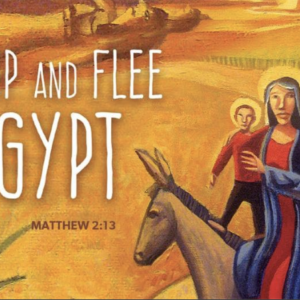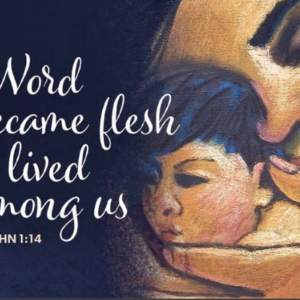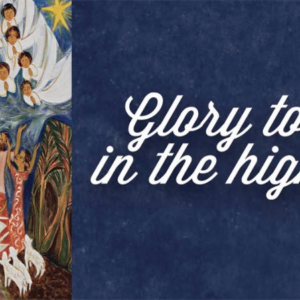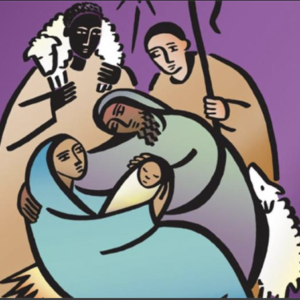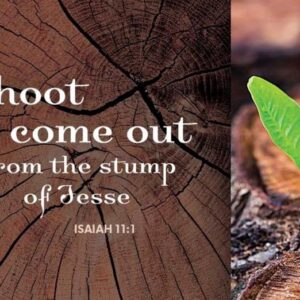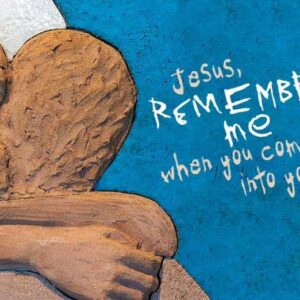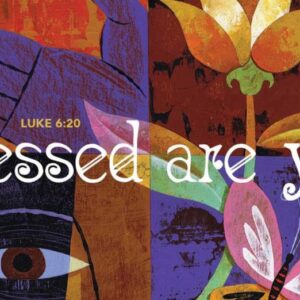First Sunday of Christmas 2023
Matthew 2:13-23
13 Now after the magi had left, an angel of the Lord appeared to Joseph in a dream and said, “Get up, take the child and his mother, and flee to Egypt, and remain there until I tell you; for Herod is about to search for the child, to destroy him.” 14 Then Joseph got up, took the child and his mother by night, and went to Egypt, 15 and remained there until the death of Herod. This was to fulfill what had been spoken by the Lord through the prophet, “Out of Egypt I have called my son.”
16 When Herod saw that he had been tricked by the magi, he was infuriated, and he sent and killed all the children in and around Bethlehem who were two years old or under, according to the time that he had learned from the magi. 17 Then was fulfilled what had been spoken through the prophet Jeremiah:
18 “A voice was heard in Ramah,
wailing and loud lamentation,
Rachel weeping for her children;
she refused to be consoled, because they are no more.”
19 When Herod died, an angel of the Lord suddenly appeared in a dream to Joseph in Egypt and said, 20 “Get up, take the child and his mother, and go to the land of Israel, for those who were seeking the child’s life are dead.” 21 Then Joseph got up, took the child and his mother, and went to the land of Israel. 22 But when Joseph heard that Archelaus was ruling over Judea in place of his father Herod, he was afraid to go there. And after being warned in a dream, he went away to the district of the Galilee. 23 There Joseph made his home in a town called Nazareth, so that what had been spoken through the prophets might be fulfilled, “He will be called a Nazorean.”
————————
Please pray with me this morning, church:
God of new beginnings,
As we begin a new year,
Nurture in us that which is good
And pleasing to you.
Seeds of compassion. Of understanding.
Of love.
Amen.
————————
Merry Christmas…and Happy New Year, church!
How are those resolutions coming? Anyone joined me in breaking some of your resolutions already? Don’t worry, it’s still early…
I wonder what your resolutions look like for you this year?
It’s not often that we get to start the year, right off the bat, with worship and praise.
Feels pretty good…
In addition to all the big feast and festival days that you all know well in the Church calendar, there are also other feast days, other festival days, other saint days, other commemorations, throughout the year that are less well known in the church, broadly. And the Church calendar has a series of 3 feast days that immediately follow the Nativity of our Lord, or Christmas, on December 25. They are the Feast of St. Stephen on December 26, the Feast of St. John on December 27, and the Feast Day of the Holy Innocents on December 28.
These three feast days, these days following Christmas are collectively known as the Comites Christi, which is Latin for the “Companions of Christ.” They are the ones whose lives and stories stand closest to Christ and are given special places of honor closest to Christ’s birth.
St. Stephen was a deacon in the early church and the first martyr of the faith, died within a year or two after the death of Jesus, stoned for speaking out against the religious authorities and professing Jesus as Lord and Savior. St. John was the only apostle said to have lived a full life and died of old age, commonly thought to be the “disciple whom Jesus loved” and the attributed author of the fourth gospel account.
A life cut drastically short. And a life lived in all its fullness.
And the Holy Innocents are the young children we hear about today in our Gospel reading. Lives taken before they’re even allowed to begin.
Tradition says that the Holy Innocents were the children of Bethlehem who were slaughtered by order of King Herod in his attempt to kill the infant Jesus – the one who it was said was born to be “King of the Judeans.” And the reason Herod the Great ordered the massacre of the children of Bethlehem was because Herod was the one put in the position of power by the Roman Empire as king of Judea. So when the wise persons who we’ll talk about next week came talking about a star and this child who was said to be born “King of the Judeans”…Herod goes full-on paranoid. Because once you’re made king, being king is not a position of power that’s often willingly given up.
So this feast day, remembers the ones that died because of Jesus’ birth—some numbers suggest as many as fourteen thousand.
There is no record of this event outside of the Gospel of Matthew, but given what we do know about the character of Herod the Great, it is certainly within the realm of possibilities. Herod drowned his sixteen-year-old brother-in-law, who was the high priest; he killed his uncle, his aunt, and his mother-in-law, along with several members of his brother-in-law’s family; he murdered his own two sons, and some three hundred other officials he accused of siding with his sons. Herod was maniacal, absolutely paranoid about losing power.
Herod did not care whose life would be taken. He did not care what would happen to the other lives of those caught up in this madness. Herod would sacrifice anyone’s life to make a political point. Herod was playing political games, and no price was too high to stay in power.
These Holy Children—these Innocents—were killed for the sake of Christ, and in one sense, in place of Christ.
The Comites Christi are a stark reminder for the church that it is into such a world as this that Jesus Christ is born.
Once again…these feast days, these saints, these holy ones—the Comites Christi—are a stark and painful reminder that it is into such a world as this that Jesus Christ is born.
As the author of John would write in that account: “God did not send the Son into the world to condemn the world, but in order that the world would be saved through him.” It is because our world is as it is, that Christ is born…in order to save us, in order to save the world. Most especially from ourselves.
Because the world is still in need of saving…
I’m thinking of our siblings in Ukraine, who are caught up in a war they neither asked for nor invited, celebrating the holidays amidst air raid sirens and missile strikes, all because powerful people are playing political games with the lives of the powerless.
I’m thinking of the dozens who lost their lives last week, mostly in the northeast, amidst some of the fiercest cold we’ve experienced in decades, all because as a society we can’t be bothered to actually commit to doing anything substantive about our housing insecure neighbors, many of whom are veterans or experience mental unwellness. We don’t lack in ability or resources, we lack in will.
I’m thinking of the 139 people, mostly families and young children, from Nicaragua and Peru and Ecuador and Colombia, who were dropped in the middle of a freezing night in Washington D.C. on Christmas Eve, most without a jacket or even long pants, all because our legislators can’t be bothered to actually talk to one another and come up with solutions to a convoluted problem, so powerful people play political games with the lives of the powerless. Even the Holy Family fled from Judea, immigrated and became refugees in Egypt, and remained there until the tyrannical and maniacal reign of Herod the Great was finally over. Surely we can muster compassion for those whose story is a mirror to that of our Lord and Savior Jesus. Again, we don’t lack in ability or resources, we lack in will and a spirit of compassion.
We are still very much a world in need of saving.
Come, again, Immanuel. Save us.
But on this new year and Sunday of complicated readings, I’m also reminded of our Intergenerational Faith Formation time a few weeks ago, when we made Christmas cards and letters for those in immigration detention facilities, and we learned a little bit about immigration and our partners at Lutheran Immigration and Refugee Services and the holy and necessary work they do. I’m reminded of 7-year old Jimena, who didn’t look up from the picture she was coloring while the video was playing, but instead softly remarked, “They’re speaking Spanish…I speak Spanish… They’re talking about Venezuela…I know Venezuela…”
As we set out on this adventure of a new year, and many of us resolve to do things differently than maybe we have before, I urge you, church, to nurture and cultivate that spirit of compassion within you. Resist getting caught up in the demonizing of folks who view and experience the world differently than you. Resist getting pulled into the political games the powerful play with the lives of the powerless. Instead, nurture that seed of compassion. Ask how you can help, rather than further driving wedges between people.
Beginning next week and continuing throughout the season of Epiphany, we’ll be guided by our theme Heaven on Earth. What does heaven look like? What would that look like here in our place?
We’ll spend time together working this out, but today, I’d suggest it has something to do with compassion. Something to do with alleviating the suffering of our siblings.
And it’s always something to do with love.
Merry Christmas…and Happy New Year, church,

